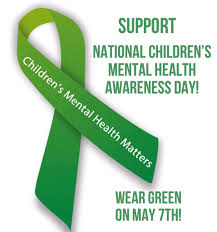 I am sitting comfortably at home during this time of social isolation thinking about what some of our students may be going through in unsupportive homes. It scares me to imagine their mental health conditions, and even physical health, if they have parents who are impatient and stressed from the COVID-19 Stay-At-Home order in effect in many states. May is Mental Health Awareness Month and May 7th is recognized as Children’s Mental Health Day.1 I published an encouraging post on my Facebook page for parents that may be struggling during this pandemic with their kids at home 24/7. To help offer further support, in this month and beyond, I wanted to share some other tips my colleagues and I have found helpful.
I am sitting comfortably at home during this time of social isolation thinking about what some of our students may be going through in unsupportive homes. It scares me to imagine their mental health conditions, and even physical health, if they have parents who are impatient and stressed from the COVID-19 Stay-At-Home order in effect in many states. May is Mental Health Awareness Month and May 7th is recognized as Children’s Mental Health Day.1 I published an encouraging post on my Facebook page for parents that may be struggling during this pandemic with their kids at home 24/7. To help offer further support, in this month and beyond, I wanted to share some other tips my colleagues and I have found helpful.
Checking In
It is important to reach out and check on students and parents to let them know you are available for questions, or simply available to talk during this challenging crisis. Many people, especially parents who may have been unemployed
due to the pandemic, are stressed, anxious, depressed, and possibly angry at the current situation. If they lack coping skills, they may become less patient with their children during this time because children often get antsy and tired of being
cooped up inside and not being able to do many of the things they used to do before the pandemic. As a result, impatient parents and children become increasingly irritated with each other as each day passes. Unfortunately, they may become verbally
or physically abusive with each other out of their emotional distress. Domestic abuse calls can start increasing in these families. For their health and safety, it is vital to reach out to students and parents to let them
know you are available to provide coping skills during this crisis.
Finding Solutions
In saying this, counselors need the technology skills and access to be able to reach out to students and parents during this crisis while students are at home. For example, I called many of the students that I normally see during a regular week to
check in with them and their parents using a Google Voice number that links directly to my personal phone number. Through this technology, students and parents have an easy way to call or text me if they need me. Google
Voice is effective if you don’t want your students and parents to know your personal number, but still need a way to communicate other than email.
I post messages related to our character word of the month, which is appropriately courageous, as well as tips on how to cope during this pandemic while at home on Remind, Google Classroom, and Twitter.
My contact information, including my Google Voice number and email, is also posted to these virtual sites. Another thing I did to reach out to students was create a Zoom meeting to see them visually and see how they are doing. I told them their parents could join too because it was just a check-in, not a private counseling session.
Counselors can also reach out to their students by joining their teachers' FlipGrid pages where they can post
short videos to students such as brief greetings or encouraging messages about completing character lesson tasks. As an elementary counselor, I purchased some hand puppets to use in my videos. We all know it takes creativity to capture kids’ attention, regardless of what grade level. These are some of things my counseling colleagues and I are doing to stay connected with them.
Remaining Available
There are many ways a school counselor can reach out to students during this
time and help them maintain good mental health and give them ways to cope with the current pandemic. It is important to remain available for all of your students throughout this crisis while our schools are closed. At least this way they know they can reach out to you if they have questions, need immediate crisis help, or
just want someone supportive to talk to during this time.
1 Image retrieved from Google image search, May 7, 2020
______________________________________________________________________
Joe Murphy, Jr. is a multilingual certified school counselor (English, Spanish, and some French) working as an elementary counselor this year in Fayette County, Tennessee. He has three years of high school counseling experience and at least thirteen years of teaching experience. His counseling interest areas include academic, career, multicultural, mental health, substance abuse, sports counseling, family, migrant youth, and GLBTQ youth issues.